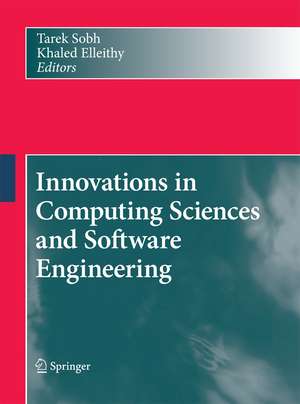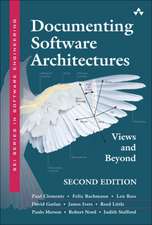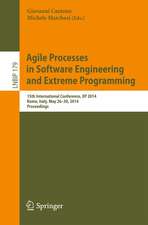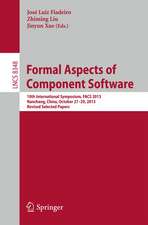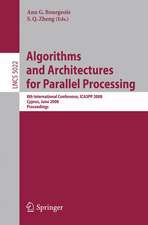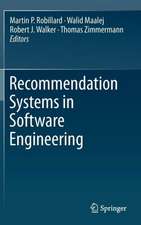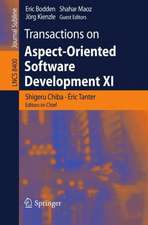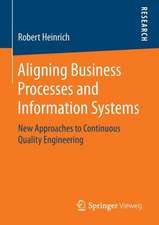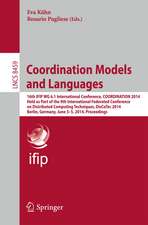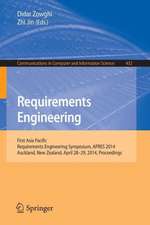Innovations in Computing Sciences and Software Engineering
Editat de Tarek Sobh, Khaled Elleithyen Limba Engleză Paperback – 20 noi 2014
Topics Covered:
•Image and Pattern Recognition: Compression, Image processing, Signal Processing Architectures, Signal Processing for Communication, Signal Processing Implementation, Speech Compression, and Video Coding Architectures.
•Languages and Systems: Algorithms, Databases, Embedded Systems and Applications, File Systems and I/O, Geographical Information Systems, Kernel and OS Structures, Knowledge Based Systems, Modeling and Simulation, Object Based Software Engineering, Programming Languages, and Programming Models and tools.
•Parallel Processing: Distributed Scheduling, Multiprocessing, Real-time Systems, Simulation Modeling and Development, and Web Applications.
•Signal and Image Processing: Content Based Video Retrieval, Character Recognition, Incremental Learning for Speech Recognition, Signal Processing Theory and Methods, and Vision-based Monitoring Systems.
•Software and Systems: Activity-Based Software Estimation, Algorithms, Genetic Algorithms, Information Systems Security, Programming Languages, Software Protection Techniques, Software Protection Techniques, and User Interfaces.
•Distributed Processing: Asynchronous Message Passing System, Heterogeneous Software Environments, Mobile Ad Hoc Networks, Resource Allocation, and Sensor Networks.
•New trends in computing: Computers for People of Special Needs, Fuzzy Inference, Human Computer Interaction, Incremental Learning, Internet-based Computing Models, Machine Intelligence, Natural Language.
| Toate formatele și edițiile | Preț | Express |
|---|---|---|
| Paperback (1) | 1221.83 lei 38-44 zile | |
| SPRINGER NETHERLANDS – 20 noi 2014 | 1221.83 lei 38-44 zile | |
| Hardback (1) | 1227.18 lei 38-44 zile | |
| SPRINGER NETHERLANDS – 25 aug 2010 | 1227.18 lei 38-44 zile |
Preț: 1221.83 lei
Preț vechi: 1527.29 lei
-20% Nou
Puncte Express: 1833
Preț estimativ în valută:
233.82€ • 253.90$ • 196.41£
233.82€ • 253.90$ • 196.41£
Carte tipărită la comandă
Livrare economică 18-24 aprilie
Preluare comenzi: 021 569.72.76
Specificații
ISBN-13: 9789400794160
ISBN-10: 9400794169
Pagini: 660
Ilustrații: XIX, 638 p.
Dimensiuni: 193 x 260 x 35 mm
Greutate: 1.37 kg
Ediția:2010
Editura: SPRINGER NETHERLANDS
Colecția Springer
Locul publicării:Dordrecht, Netherlands
ISBN-10: 9400794169
Pagini: 660
Ilustrații: XIX, 638 p.
Dimensiuni: 193 x 260 x 35 mm
Greutate: 1.37 kg
Ediția:2010
Editura: SPRINGER NETHERLANDS
Colecția Springer
Locul publicării:Dordrecht, Netherlands
Public țintă
ResearchCuprins
Recursive Projection Profiling for Text-Image Separation.- Risk in the Clouds?: Security Issues Facing Government Use of Cloud Computing.- Open Source Software (OSS) Adoption Framework for Local Environment and its Comparison.- Ubiquitous Data Management in a Personal Information Environment.- Semantics for the Asynchronous Communication in LIPS, a Language for Implementing Parallel/distributed Systems.- Separation of Concerns in Teaching Software Engineering.- Student Model Based on Flexible Fuzzy Inference.- PlanGraph: An Agent-Based Computational Model for Handling Vagueness in Human-GIS Communication of Spatial Concepts.- Risk-Based Neuro-Grid Architecture for Multimodal Biometrics.- A SQL-Database Based Meta-CASE System and its Query Subsystem.- An Intelligent Control System Based on Non-Invasive Man Machine Interaction.- A UML Profile for Developing Databases that Conform to the Third Manifesto.- Investigation and Implementation of T-DMB Protocol in NCTUns Simulator.- Empirical Analysis of Case-Editing Approaches for Numeric Prediction.- Towards a Transcription System of Sign Language for 3D Virtual Agents.- Unbiased Statistics of a Constraint Satisfaction Problem – a Controlled-Bias Generator.- Factors that Influence the Productivity of Software Developers in a Developer View.- Algorithms for Maintaining a Consistent Knowledge Base in Distributed Multiagent Environments.- Formal Specifications for a Document Management Assistant.- Towards a Spatial-Temporal Processing Model.- Structure, Context and Replication in a Spatial-Temporal Architecture.- Service Oriented E-Government.- Fuzzy-rule-based Adaptive Resource Control for Information Sharing in P2P Networks.- Challenges in Web Information Retrieval.- An Invisible Text Watermarking Algorithm using ImageWatermark.- A Framework for RFID Survivability Requirement Analysis and Specification.- The State of Knowledge Management in Czech Companies.- A Suitable Software Process Improvement Model for the UK Healthcare Industry.- Exploring User Acceptance of FOSS: The Role of the Age of the Users.- GFS Tuning Algorithm Using Fuzzimetric Arcs.- Multi-step EMG Classification Algorithm for Human-Computer Interaction.- Affective Assessment of a Computer User through the Processing of the Pupil Diameter Signal.- MAC, A System for Automatically IPR Identification, Collection and Distribution.- Testing Distributed ABS System with Fault Injection.- Learning Based Approach for Optimal Clustering of Distributed Program's Call Flow Graph.- Fuzzy Adaptive Swarm Optimization Algorithm for Discrete Environments.- Project Management Software for Distributed Industrial Companies.- How to Construct an Automated Warehouse Based on Colored Timed Petri Nets.- Telecare and Social Link Solution for Ambient Assisted Living Using a Robot Companion with Visiophony.- Contextual Semantic: A Context-aware Approach for Semantic Web Based Data Extraction from Scientific Articles.- Motivating Company Personnel by Applying the Semi-self-organized Teams Principle.- Route Advising in a Dynamic Environment – A High-Tech Approach.- Building Security System Based on Grid Computing To Convert and Store Media Files.- A Tool Supporting C code Parallelization.- Extending OpenMP for Agent Based DSM on GRID.- Mashup – Based End User Interface for Fleet Monitoring.- The Performance of Geothermal Field Modeling in Distributed Component Environment.- An Extension of Least Squares Methods for Smoothing Oscillation of Motion Predicting Function.- Security of Virtualized Applications: Microsoft App-V and VMware ThinApp.-Noise Performance of a Finite Uniform Cascade of Two-Port Networks.- Evaluating Software Agent Quality: Measuring Social Ability and Autonomy.- An Approach to Measuring Software Quality Perception.- Automatically Modeling Linguistic Categories in Spanish.- Efficient Content-based Image Retrieval using Support Vector Machines for Feature Aggregation.- The Holistic, Interactive and Persuasive Model to Facilitate Self-care of Patients with Diabetes.- Jawi Generator Software Using ARM Board Under Linux.- Efficient Comparison between Windows and Linux Platform Applicable in a Virtual Architectural Walkthrough Application.- Simulation-Based Stress Analysis for a 3D Modeled Humerus-Prosthesis Assembly.- Chaos-Based Bit Planes Image Encryption.- FLEX: A Modular Software Architecture for Flight License Exam.- Enabling and Integrating Distributed Web Resources for Efficient and Effective Discovery of Information on the Web.- Translation from UML to Markov Model: A Performance Modeling Framework.- A Comparative Study of Protein Sequence Clustering Algorithms.- OpenGL in Multi-User Web-Based Applications.- Testing Task Schedulers on Linux System.- Automatic Computer Overhead Line Design.- Building Test Cases through Model Driven Engineering.- The Effects of Educational Multimedia for Scientific Signs in the Holy Quran in Improving the Creative Thinking Skills for Deaf Children.- Parallelization of Shape Function Generation for Hierarchical Tetrahedral Elements.- Analysis of Moment Invariants on Image Scaling and Rotation.- A Novel Binarization Algorithm for Ballistics Firearm Identification.- A Schema Classification Scheme for Multilevel Databases.- Memory Leak Sabotages System Performance.- Writer Identification Using Inexpensive Signal Processing Techniques.- Software ArtifactsExtraction for Program Comprehension.- Model-Driven Engineering Support for Building C# Applications.- Early Abnormal Overload Detection and the Solution on Content Delivery Network.- ECG Feature Extraction using Time Frequency Analysis.- Optimal Component Selection for Component-Based Systems.- Domain-based Teaching Strategy for Intelligent Tutoring System Based on Generic Rules.- Parallelization of Edge Detection Algorithm using MPI on Beowulf Cluster.- Teaching Physical Based Animation via OpenGL Slides.- Appraising the Corporate Sustainability Reports – Text Mining and Multi-Discriminatory Analysis.- A Proposed Treatment for Visual Field Loss caused by Traumatic Brain Injury using Interactive Visuotactile Virtual Environment.- Adaptive Collocation Methods for the Solution of Partial Differential Equations.- Educational Virtual Reality through a Multiview Autostereoscopic 3D Display.- An Approach for Developing Natural Language Interface to Databases Using Data Synonyms Tree and Syntax State Table.- Analysis of Strategic Maps for a Company in the Software Development Sector.- The RDF Generator (RDFG) - First Unit in the Semantic Web Framework (SWF).- Information Technology to Help Drive Business Innovation and Growth.- A Framework for Enterprise Operating Systems Based on Zachman Framework.- A Model for Determining the Number of Negative Examples used in Training a MLP.- GPU Benchmarks Based On Strange Attractors.- Effect of Gender and Sound Spatialization on Speech Intelligibility in Multiple Speaker Environment.- Modeling Tourism Sustainable Development.- PI-ping - Benchmark Tool for Testing Latencies and Throughput in Operating Systems.- Towards Archetypes-Based Software Development.- Dependability Aspects Regarding the Cache Level of a Memory Hierarchy usingHamming Codes.- Performance Evaluation of an Intelligent Agents Based Model within Irregular WSN Topologies.- Double Stage Heat Transformer Controlled by Flow Ratio.- Enforcement of Privacy Policies over Multiple Online Social Networks for Collaborative Activities.- An Estimation of Distribution Algorithms Applied to Sequence Pattern Mining.- Tlatoa Communicator.- Using Multiple Datasets in Information Visualization Tool.- Improved Crack Type Classification Neural Network based on Square Sub-images of Pavement Surface.- Building Information Modeling as a Tool for the Design of Airports.- A Petri-Nets Based Unified Modeling Approach for Zachman Framework Cells.- From Perspectiva Artificialis to Cyberspace: Game-Engine and the Interactive Visualization of Natural Light in the Interior of the Building.- Computational Shape Grammars and Non-Standardization: a Case Study on the City of Music of Rio de Janeiro.- Architecture Models and Data Flows in Local and Group Datawarehouses.
Textul de pe ultima copertă
Innovations in Computing Sciences and Software Engineering includes a set of rigorously reviewed world-class manuscripts addressing and detailing state-of-the-art research projects in the areas of Computer Science, Software Engineering, Computer Engineering, and Systems Engineering and Sciences.
Topics Covered:
•Image and Pattern Recognition: Compression, Image processing, Signal Processing Architectures, Signal Processing for Communication, Signal Processing Implementation, Speech Compression, and Video Coding Architectures.
•Languages and Systems: Algorithms, Databases, Embedded Systems and Applications, File Systems and I/O, Geographical Information Systems, Kernel and OS Structures, Knowledge Based Systems, Modeling and Simulation, Object Based Software Engineering, Programming Languages, and Programming Models and tools.
•Parallel Processing: Distributed Scheduling, Multiprocessing, Real-time Systems, Simulation Modeling and Development, and Web Applications.
•Signal and Image Processing: Content Based Video Retrieval, Character Recognition, Incremental Learning for Speech Recognition, Signal Processing Theory and Methods, and Vision-based Monitoring Systems.
•Software and Systems: Activity-Based Software Estimation, Algorithms, Genetic Algorithms, Information Systems Security, Programming Languages, Software Protection Techniques, Software Protection Techniques, and User Interfaces.
•Distributed Processing: Asynchronous Message Passing System, Heterogeneous Software Environments, Mobile Ad Hoc Networks, Resource Allocation, and Sensor Networks.
•New trends in computing: Computers for People of Special Needs, Fuzzy Inference, Human Computer Interaction, Incremental Learning, Internet-based Computing Models, Machine Intelligence, Natural Language.
Topics Covered:
•Image and Pattern Recognition: Compression, Image processing, Signal Processing Architectures, Signal Processing for Communication, Signal Processing Implementation, Speech Compression, and Video Coding Architectures.
•Languages and Systems: Algorithms, Databases, Embedded Systems and Applications, File Systems and I/O, Geographical Information Systems, Kernel and OS Structures, Knowledge Based Systems, Modeling and Simulation, Object Based Software Engineering, Programming Languages, and Programming Models and tools.
•Parallel Processing: Distributed Scheduling, Multiprocessing, Real-time Systems, Simulation Modeling and Development, and Web Applications.
•Signal and Image Processing: Content Based Video Retrieval, Character Recognition, Incremental Learning for Speech Recognition, Signal Processing Theory and Methods, and Vision-based Monitoring Systems.
•Software and Systems: Activity-Based Software Estimation, Algorithms, Genetic Algorithms, Information Systems Security, Programming Languages, Software Protection Techniques, Software Protection Techniques, and User Interfaces.
•Distributed Processing: Asynchronous Message Passing System, Heterogeneous Software Environments, Mobile Ad Hoc Networks, Resource Allocation, and Sensor Networks.
•New trends in computing: Computers for People of Special Needs, Fuzzy Inference, Human Computer Interaction, Incremental Learning, Internet-based Computing Models, Machine Intelligence, Natural Language.
Caracteristici
All communications between the authors, reviewers, and conference organizing committee were done on line PowerPoint presentations, final paper manuscripts were available to registrants The conference platform allowed live presentations by several presenters from different locations, with the audio, video and PowerPoint presentations transmitted to attendees throughout the internet, even on dial up connections
